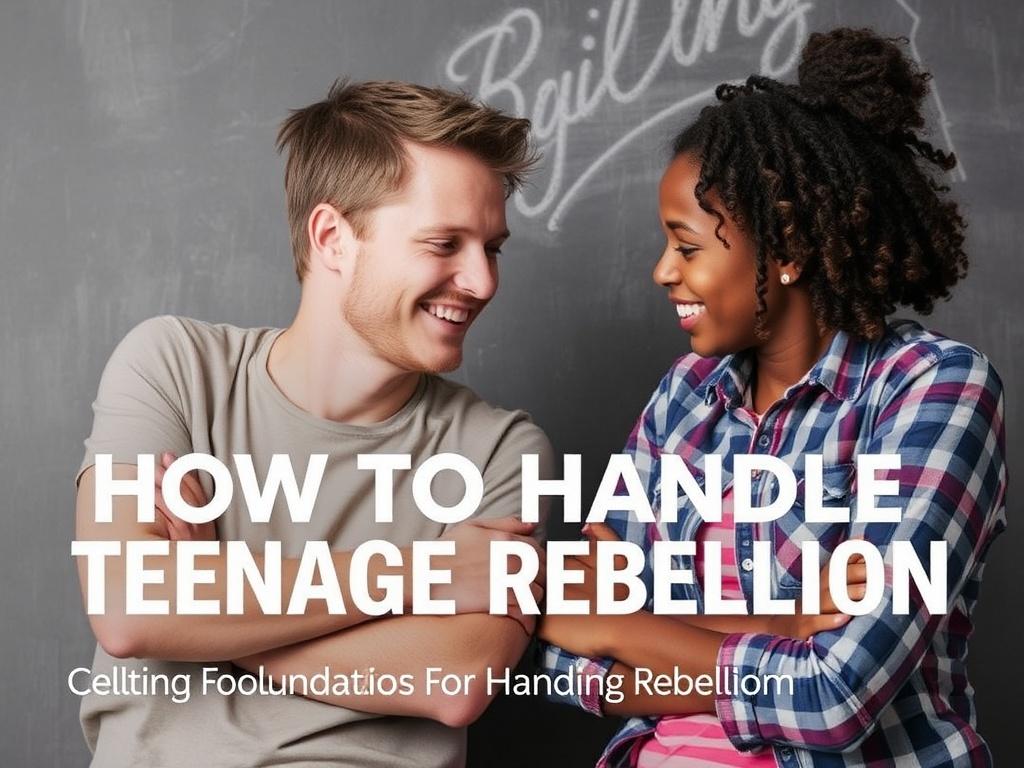SQLITE NOT INSTALLED
Teenage rebellion is a phase that nearly every parent encounters at some point. It’s a challenging yet natural part of adolescent development, as teenagers strive to assert their independence, form their identities, and push boundaries. While rebellion can sometimes feel frustrating or even painful for parents, it also offers a unique opportunity to strengthen family bonds and guide your child toward becoming a responsible adult.
In this comprehensive article, we will explore effective strategies on how to handle teenage rebellion with patience, understanding, and clear communication. We will also discuss common causes of rebellious behavior, tips for setting boundaries, and ways to nurture trust and respect. Whether you’re currently facing defiant behavior from your teen or simply want to prepare for this stage, read on to gain valuable insights.
Understanding Teenage Rebellion: Why Teens Push Boundaries

Before diving into specific techniques on how to handle teenage rebellion, it’s important to understand what’s behind it. Rebellion is often a normal response to the emotional and physical changes teens experience. It’s their way of exploring their growing need for autonomy and self-expression. While it may seem like your teenager is trying to challenge your authority, it’s often less about disrespect and more about figuring out who they are.
The psychological roots of rebellion include:
- Identity formation: Teenagers are striving to discover their sense of self, which can involve testing limits to see where they fit.
- Desire for independence: They want to make their own decisions—even if that means making mistakes.
- Peer influence: Friends and social groups may encourage behaviors that parents find difficult to accept.
- Emotional fluctuations: Hormonal changes can heighten mood swings and sensitivity, leading to unpredictable reactions.
Understanding these factors helps parents approach rebellion with empathy rather than frustration. This mindset sets the foundation for healthier communication and more effective discipline strategies.
Common Signs of Teenage Rebellion
Recognizing the signs of rebellion early on can help parents intervene in a timely and constructive manner. Not all teens rebel in the same ways, but some common behaviors include:
| Behavior | Description | Potential Causes |
|---|---|---|
| Defiance | Refusal to follow rules or instructions | Testing boundaries or asserting independence |
| Frequent arguing | Challenging authority and engaging in heated debates | Emotional turbulence and desire for respect |
| Secretiveness | Withholding information or hiding activities | Fear of judgment or desire for privacy |
| Risky behaviors | Experimenting with alcohol, drugs, or unsafe activities | Peer pressure and testing limits |
| Withdrawal | Isolating from family and old friends | Struggling with identity or emotional challenges |
Being watchful for these behaviors allows parents to address problems early on with compassion and firmness.
How to Handle Teenage Rebellion: Practical Tips for Parents
Now that we understand teenage rebellion better, how exactly can parents handle it effectively? It’s a careful balance of setting clear boundaries, maintaining open communication, and showing unconditional love. Here are some key strategies to try.
1. Stay Calm and Patient
When your teen acts out, your first instinct might be to react with anger or frustration. However, responding emotionally can escalate conflicts and drive a wedge between you and your teenager. Instead, take deep breaths and maintain composure.
Try to listen openly without interrupting, even if you disagree strongly. Remaining calm creates a safer space where your teen can feel heard and understood, which decreases rebellious pushback over time.
2. Establish Clear Rules and Consequences
Teenagers need structure, even when they fight against it. Sit down with your teen and collaboratively set household rules that you both agree on. Make sure they understand the consequences for breaking these rules, and enforce them consistently.
Examples of effective house rules for teenagers might include:
- Curfew times on school nights and weekends
- Restrictions on substance use
- Guidelines for screen time and social media
- Respectful communication expectations
- Participation in household chores
Clear rules don’t stifle freedom; they promote safety and respect.
3. Communicate Openly and Honestly
One of the best ways to handle teenage rebellion is maintaining an open line of communication. Make it a habit to check in with your teen daily, and talk about their thoughts, feelings, or problems without judgment.
Use “I” statements to express your concerns, such as “I feel worried when you don’t come home on time,” rather than “You’re always breaking rules.” This invites cooperation rather than defensiveness.
4. Choose Your Battles Wisely
Not every behavior needs to spark a conflict. Sometimes it’s best to let minor rebellious acts pass if they are not harmful. For example, experimenting with a new hairstyle or music choice may be annoying but not dangerous. By focusing on what truly matters—health, safety, integrity—you show respect for your teen’s individuality while protecting their well-being.
5. Encourage Positive Activities and Interests
Teenagers need outlets to channel their energy and emotions. Encourage involvement in sports, arts, volunteer work, or clubs to build confidence and give them a sense of accomplishment. These positive pursuits can reduce rebellious acts by providing structure and self-esteem.
6. Seek Professional Help When Needed
If rebellion escalates into dangerous behavior—such as substance abuse, violence, or severe withdrawal—don’t hesitate to seek professional support. Counselors, therapists, and family mediators can provide guidance and tools tailored to your family’s unique situation.
Common Mistakes Parents Make When Handling Teenage Rebellion
It’s normal to feel overwhelmed, and even experienced parents can sometimes slip into counterproductive habits. Here are some common mistakes to avoid:
| Mistake | Why It Happens | Impact | How to Avoid |
|---|---|---|---|
| Overreacting emotionally | Frustration and fear for child’s safety | Escalates conflicts and damages trust | Pause before responding, stay calm |
| Being too permissive | Desire to avoid conflicts | Leads to lack of boundaries, confusion | Set consistent limits with consequences |
| Ignoring warning signs | Denial or lack of awareness | Problems worsen over time | Monitor behavior, address issues early |
| Using labels or criticism | Frustration or misunderstanding teen’s intentions | Harms self-esteem, increases rebellion | Focus on behavior, not character |
| Lack of communication | Busy schedules or discomfort | Disconnect and secrecy increase | Prioritize open dialogues regularly |
By being mindful of these pitfalls, you can create a more supportive environment that reduces rebellion and promotes harmony.
Building a Strong Parent-Teen Relationship: Foundations for Handling Rebellion

Handling teenage rebellion is not only about managing conflict—it’s also about nurturing a strong, enduring relationship with your teen. Here’s how to build that foundation:
Show Unconditional Love and Acceptance
Your teen needs to know that no matter how difficult things get, your love isn’t conditional on good behavior or success. Express affection regularly and reassure them that mistakes won’t make you love them less. This fosters emotional security and resilience.
Spend Quality Time Together
Shared experiences build trust. Find activities that both you and your teenager enjoy, whether hiking, cooking, playing games, or watching movies. These moments strengthen your bond and open more opportunities for meaningful conversations.
Encourage Responsibility and Decision-Making
Let your teenager make choices appropriate for their age while guiding them toward considering consequences. This helps them develop critical thinking and accountability, reducing their impulse to rebel out of frustration.
Model the Behavior You Want to See
Teens learn a lot from observing parents. Demonstrate respect, patience, and healthy conflict resolution yourself. Showing humility and admitting when you’re wrong teaches your teen it’s okay to make mistakes and grow.
Effective Communication Techniques for Handling Teenage Rebellion
Let’s explore specific communication skills that improve dialogue with your teenager:
- Active Listening: Truly hear what your teen is saying without interrupting. Reflect back their feelings to show understanding.
- Open-ended Questions: Ask questions that require more than yes/no answers, e.g., “How did that make you feel?”
- Empathy: Acknowledge their emotions, even if you disagree with their choices.
- Nonverbal Cues: Maintain eye contact, nod, and use calm tone and body language.
- Negotiation: Be willing to compromise when possible to show respect for their growing independence.
Practice these skills regularly to reduce misunderstandings and foster cooperation.
Handling Specific Scenarios of Teenage Rebellion
Every family faces unique challenges. Below are some common scenarios with tailored advice:
Scenario 1: Your Teen Stays Out Late Without Permission
This can create worry and anger. Instead of reacting impulsively, calmly express why you’re concerned for their safety. Ask why they stayed out late and listen carefully. Together, review and, if needed, adjust curfew rules. Follow through consistently on any agreed consequences.
Scenario 2: Your Teen Experiments with Substances
This is a serious issue. Educate your teen on risks in an open, non-judgmental way. Try to understand peer pressures they face. Encourage healthy alternatives and seek counseling if necessary. Be firm on rules about drug and alcohol use to protect their health.
Scenario 3: Your Teen Is Secretive and Withdrawn
Withdrawal could signal emotional distress. Create a safe environment for them to open up. Gently encourage sharing feelings without pressuring. Consider professional support if they seem depressed or anxious.
Resources for Parents: Where to Find More Help
Handling teenage rebellion can sometimes require outside assistance. Here are valuable resources parents can turn to:
| Resource | Purpose | Contact Information |
|---|---|---|
| Parenting Support Groups | Share experiences and advice with other parents | Local community centers, online forums like Reddit’s r/Parenting |
| Family Therapists | Professional help to improve family dynamics | Search Psychology Today’s therapist directory |
| School Counselors | Support for academic and emotional issues | Contact your child’s school office |
| Hotlines for Crisis Support | Immediate help for mental health emergencies | National Suicide Prevention Lifeline: 988 (US) |
Reaching out for help signals strength and commitment to your teen’s well-being.
The Long-Term Benefits of Handling Teenage Rebellion Well
While teenage rebellion can be taxing, navigating it thoughtfully yields long-term rewards. Teens who feel respected and understood are likelier to develop into well-adjusted adults capable of healthy relationships, problem-solving, and self-regulation.
By investing time and care now, you’re cultivating trust and open communication habits that endure beyond adolescence. Your teen will remember you not just as an enforcer of rules but as a reliable source of love and guidance.
Conclusion: Embrace the Challenge with Compassion and Confidence

Handling teenage rebellion isn’t easy, but it’s one of the most important parenting challenges we face. By understanding the emotional dynamics behind rebellion, setting clear and consistent limits, communicating openly, and showing unconditional love, you build a strong foundation for your teen’s growth.
Remember, every rebellious moment is also an opportunity—an opportunity to teach, listen, and connect. Embrace this phase with patience and confidence, knowing that your efforts today shape your teenager’s journey into a thriving adult tomorrow.
Thank you for reading this comprehensive guide on how to handle teenage rebellion. We hope these insights bring you closer to your teenager and turn rebellion from a source of stress into a bridge for stronger family bonds.
